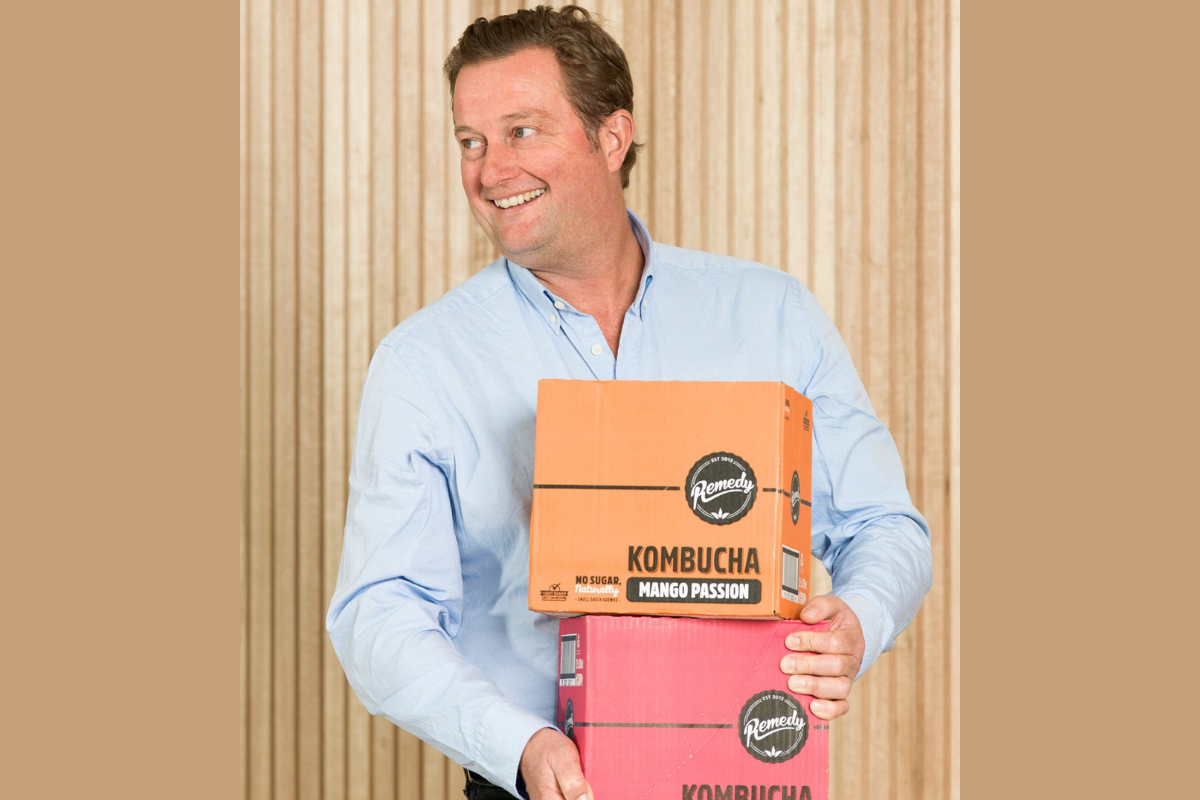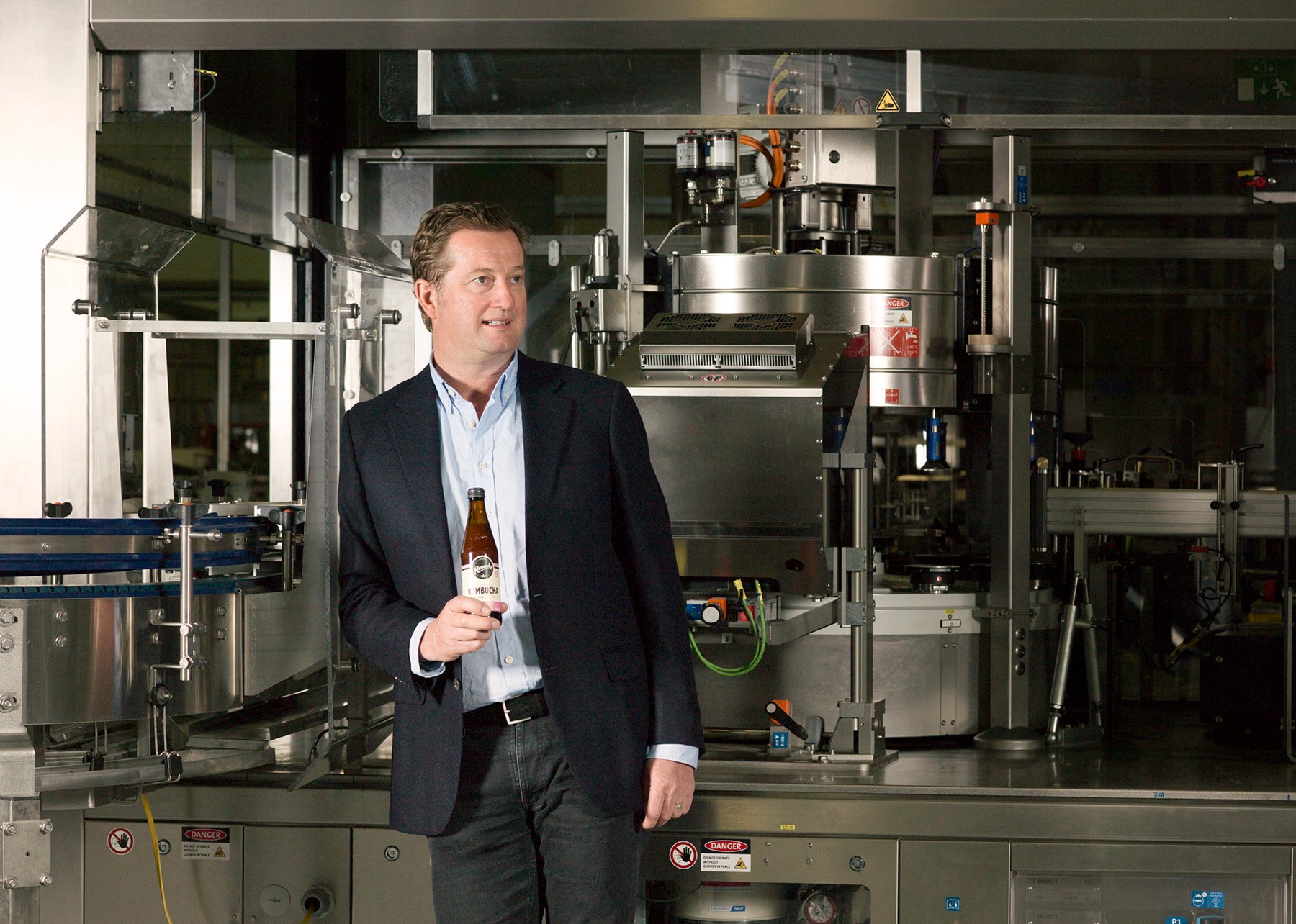Shaking Things Up: Chris Gillard
Kombucha maker Remedy Drinks helped make the fermented beverage mainstream in Australia. Now, Managing Director Chris Gillard wants to change the soft drinks market for good.
When Remedy Drinks began brewing kombucha in a small facility in Melbourne 10 years ago, there was barely a market for the fermented health drink. Remedy’s founders knew they would have to help build it up with a high-quality product and captivating marketing.

Their efforts produced impressive results, and as demand grew, the company quickly ran out of space at its facility. They then faced a challenge that every startup hopes for – how to respond to a swelling number of orders without sacrificing quality.
Some other beverage companies were beginning to enter the market, but those were merely outsourcing the production of their kombucha and then selling it through their own channels. For Remedy, that wasn’t good enough; production had to stay in-house to ensure the best quality. So the company opted for rapid, ad hoc expansion of its manufacturing capacity.
"We were very determined to make our own kombucha from the beginning, but as the business grew, we ran out of space," says Managing Director Chris Gillard. "So we rented the place three doors down in order to maintain control of the manufacturing process. Then, when we ran out of space there, we went around the corner and rented another place."
Focus on quality
Eventually, Remedy had four different facilities operating to keep up with demand. It may not have been the most cost-effective set-up, but it was vital in order to stay true to the company’s founding mission to "shake up fizzy drinks for good" by offering a genuinely healthy and delicious product.
"Maintaining your own manufacturing is a very important part of protecting your brand and the quality," Chris says. "We’re pretty good at making kombucha, and we now know we’re good at scaling the production of it. That’s something that separates us from a lot of brands that get other people to make their kombucha."

Maintaining your own manufacturing is a very important part of protecting your brand and the quality.
Chris says Remedy’s focus on quality is a vital differentiator. "Fermenting drinks and creating ones that taste good at the end of the process and have no alcohol in them requires quite a bit of sophistication, know-how and technical knowledge," he says.
He joined the company as Managing Director in 2019, at a time when Remedy had already done a lot of scaling up but needed his expert guidance on perfecting the company’s structure, processes and organisational evolution. "That was the timing of my arrival. We were trying to work out our manufacturing strategy, our marketing strategy," he explains.
On top of this, developing and maintaining strong, long-lasting relationships with suppliers is also of high importance at Remedy. "Our partnership with Teavision, for example, goes back many years. The level of commitment to quality, service, innovation and sustainability that they demonstrated has led to us increasing their scope of supply to include multiple other raw materials over that time with multi-year contracts in place," Chris says.
Growth and innovation
Earlier this year, Chris’s innovative strategies began to pay off when Remedy opened a new, purpose-built facility in Melbourne’s Dandenong South, which brought all of its manufacturing processes back together under one roof and set the company up for, what he anticipates will be, an even more rapid expansion.
"While we are very pleased with how we’ve built the brand over the last few years, we still see huge amounts of growth in the kombucha segment of the market," Chris says. "If you looked at the total non-alcoholic, ready-to-drink landscape, kombucha would be about one-to-two per cent of total sales, so there is an enormous amount of opportunity to grow there."
As well as growing sales of kombucha, Chris is also pursuing expansion by moving into other beverages. "We started as a kombucha brand that was very much rooted in health," Chris says. "Since I started with the business, we’ve taken that position of great-tasting kombucha into a broader health soft drink play."
Early this year, Remedy launched Sodaly, a fermented prebiotic soda available in six flavours. The company’s new offerings also include apple cider vinegar switchels and a range of shots – 60-millilitre drinks that boost immunity and aid digestion. "The idea is that it’s a little dose of goodness," Chris says.
Taking a shot
While other countries, including the US, have well-developed markets for these non-alcoholic shot drinks, such products have struggled to take off in Australia despite several attempts by other companies to launch them over the past two decades.
"Various people have tried it here, but in general they were targeting the energy drinks part of the market, whereas we’re focusing very much on the ‘better for you’ aspect of shots," he explains.
We started as a kombucha brand that was very much rooted in health. Over time, we’ve taken our kombucha strategy and built it into a broader soft drink play.
There are signs that this segment of the market is heating up. Local competitors in the kombucha space, as well as in juice, are also starting to sell shots of their beverages, while some new brands are entering the segment, too.
"The retail marketplace is excited about growing the category because it’s an efficient use of space," Chris says. "I think the consumer likes the idea of having something that’s good for them that’s not a large amount of liquid, that they can consume quickly on the go. So we see that being a great area of growth."
Bursting with ideas
Remedy also has a range of other innovations in the pipeline that it will roll out over the next two years. "Rest assured, we’ve got lots of ideas," Chris says. But he cautions that while it’s great to have a creative team bursting with new ideas, it’s also vital to be meticulous about how and when you try to bring them to market.
"It’s really important to make sure you take the time before you go out to market to ensure that your proposition is going to work," Chris says. "Innovation’s important to growth, but it can just as easily be an expensive exercise if not done well. So we’re trying to do fewer bigger, better ideas, sequenced out over an appropriate time frame."
The company is also innovating with different packaging formats. Remedy’s kombucha was first launched in a brown glass bottle, which is one reason it was able to cut through and grab shopper’s attention on the shelves.
"The brown glass bottle probably helped disrupt the industry, because most people felt brown glass bottles were the domain of the beer industry." Chris says. "People weren’t used to seeing brown glass bottles in a soft drink aisle."
The brown glass bottle probably helped disrupt the industry, because most people felt brown glass bottles were the domain of the beer industry. People weren’t used to seeing brown glass bottles in a soft drink aisle.
Now that consumers are more familiar with the product, Remedy is trying other packaging formats, such as colourful cans.
"In addition to expanding our portfolio, we’ve spent a lot of time getting our pack price channel architecture right," Chris says. "That’s industry speak for which products should go into which outlet, in which sizes, at what price points."
Global expansion
While Remedy works on carving out a bigger space in the Australian and New Zealand markets, it is also expanding its international footprint. The company already has a firm foothold in the US, Canada, the UK, Singapore and Hong Kong and is now building on that.
"Increasingly, you’ll see us in the Philippines, Thailand and Korea," Chris says.
As that expansion continues, Chris will work to ensure that Remedy stays true to its founding values. "We’re big on authenticity; it cuts to the very heart of the drink we make," he says.
"Think back to our founders," he adds. "Who would’ve thought of creating a kombucha business 10 years ago in this marketplace? Most people told them they were crazy and it wouldn’t work, and so there’s a ‘have a go’ attitude in our culture. Don’t die wondering."
Proudly supported by:
Teavision